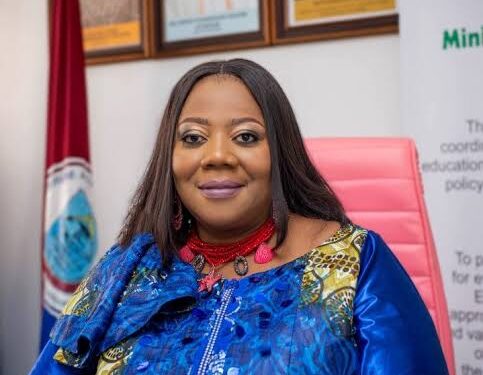I’ve noticed many people asking “who is the commissioner of education in Edo State?” As someone who follows Nigerian state politics closely, I’ll give you the straight facts about this role and its current holder.
Commissioner of Education in Edo State
Dr. Joan Osa Oviawe serves as the Commissioner of Education in Edo State. She leads the state’s educational initiatives under Governor Godwin Obaseki’s administration.
Background and Qualifications
Let’s look at Dr. Oviawe’s credentials:
• PhD in Education Policy
• Years of experience in educational reform
• Strong background in curriculum development
• Proven track record in educational administration
Role and Responsibilities
The Commissioner handles:
• Education policy implementation
• School system oversight
• Teacher development programs
• Educational infrastructure
• Curriculum standards
• Budget management
Key Achievements Under Current Leadership

Several programs have started since Dr. Oviawe took office:
1. EdoBEST program expansion
2. Teacher training initiatives
3. School infrastructure improvements
4. Digital learning programs
5. Student performance tracking
Daily Operations
The commissioner’s office manages:
• Public school operations
• Private school regulations
• Educational standards
• Teacher appointments
• School inspections
• Educational partnerships
Impact on Edo State Education
Changes made include:
• Modern teaching methods
• Better school facilities
• Improved teacher training
• Higher student attendance
• Better exam results
Working with Other Officials
The commissioner collaborates with:
• The Governor
• State Assembly
• Local Government Education Authorities
• School principals
• Teachers’ unions
Educational Policies
Current focus areas:
1. Digital literacy
2. Basic education
3. Technical education
4. Teacher development
5. School management
Future Plans
Upcoming initiatives include:
• More school renovations
• Teacher recruitment drives
• Technology integration
• Curriculum updates
• Student support programs
Community Engagement
The commissioner connects through:
• Town hall meetings
• School visits
• Parent forums
• Teacher conferences
• Student programs
Challenges and Solutions
Common issues addressed:
1. Infrastructure needs
2. Teacher training
3. Student performance
4. Resource allocation
5. Technology adoption
Success Stories
Recent wins include:
• Higher graduation rates
• Better test scores
• More trained teachers
• Improved facilities
• Stronger programs
Educational Standards
Focus points include:
1. Academic excellence
2. Student safety
3. Teacher quality
4. Modern facilities
5. Learning outcomes
Contact Information
Reach the commissioner’s office via:
• Official email
• Office phone
• Social media
• Physical office
• Public events
Public Appearances
The commissioner attends:
• School ceremonies
• Education conferences
• Community meetings
• Policy discussions
• Training sessions
Resource Management
Oversight includes:
• Budget allocation
• Staff deployment
• Material distribution
• Infrastructure projects
• Program funding
Innovation in Education
New programs feature:
1. Digital classrooms
2. Online learning
3. Skills training
4. Special education
5. Sports programs

Partnership Programs
Working relationships with:
• International organizations
• Local businesses
• NGOs
• Other states
• Federal agencies
Educational Research
Studies focus on:
1. Learning methods
2. Student outcomes
3. Teacher effectiveness
4. Resource use
5. Program impact
Technology Integration
Digital initiatives include:
• Computer labs
• Online classes
• Digital libraries
• Learning apps
• Internet access
Student Support
Programs offer:
1. Counseling services
2. Career guidance
3. Special needs support
4. Gifted programs
5. Extra help classes
Teacher Development
Focus areas include:
• Professional training
• Skills updates
• Technology use
• Teaching methods
• Career growth
School Infrastructure
Projects cover:
1. Building repairs
2. New construction
3. Equipment updates
4. Safety measures
5. Facility upgrades
Community Support
Local involvement through:
• Parent committees
• Business partnerships
• Volunteer programs
• Mentoring
• Resource sharing
Quality Control
Monitoring includes:
1. Regular inspections
2. Performance reviews
3. Student assessments
4. Teacher evaluations
5. Program audits
Communication Channels
Information flows through:
• Official notices
• Media releases
• School meetings
• Digital platforms
• Direct contact
Emergency Response
Plans cover:
1. School safety
2. Health issues
3. Natural disasters
4. Security concerns
5. Crisis management
Future Vision
Goals include:
• Better education access
• Higher standards
• More resources
• Stronger outcomes
• Greater opportunities
Making Changes
Steps taken:
1. Policy updates
2. Program launches
3. Staff training
4. Resource allocation
5. System improvements
Working Together
Collaboration with:
• Teachers
• Parents
• Students
• Communities
• Partners
Getting Results
Measuring success through:
1. Test scores
2. Graduation rates
3. Student feedback
4. Teacher performance
5. Program outcomes
Next Steps
Plans include:
• More improvements
• New programs
• Better resources
• Stronger support
• Higher standards
Final Thoughts
So, who is the commissioner of education in Edo State? Now you know it’s Dr. Joan Osa Oviawe, and you understand her role in shaping education across the state. Her work continues to influence thousands of students and teachers every day.
Contact Options:
• Visit the education ministry
• Send an email
• Make a phone call
• Attend public events
• Follow social media
The commissioner’s office stays open to ideas and feedback from everyone interested in improving education in Edo State.












